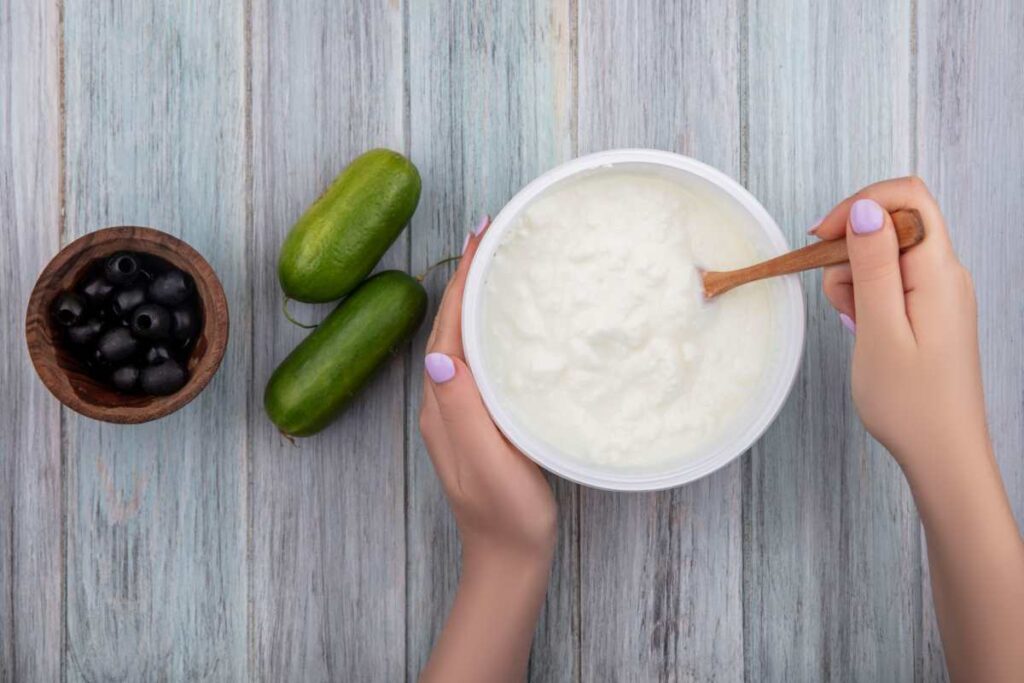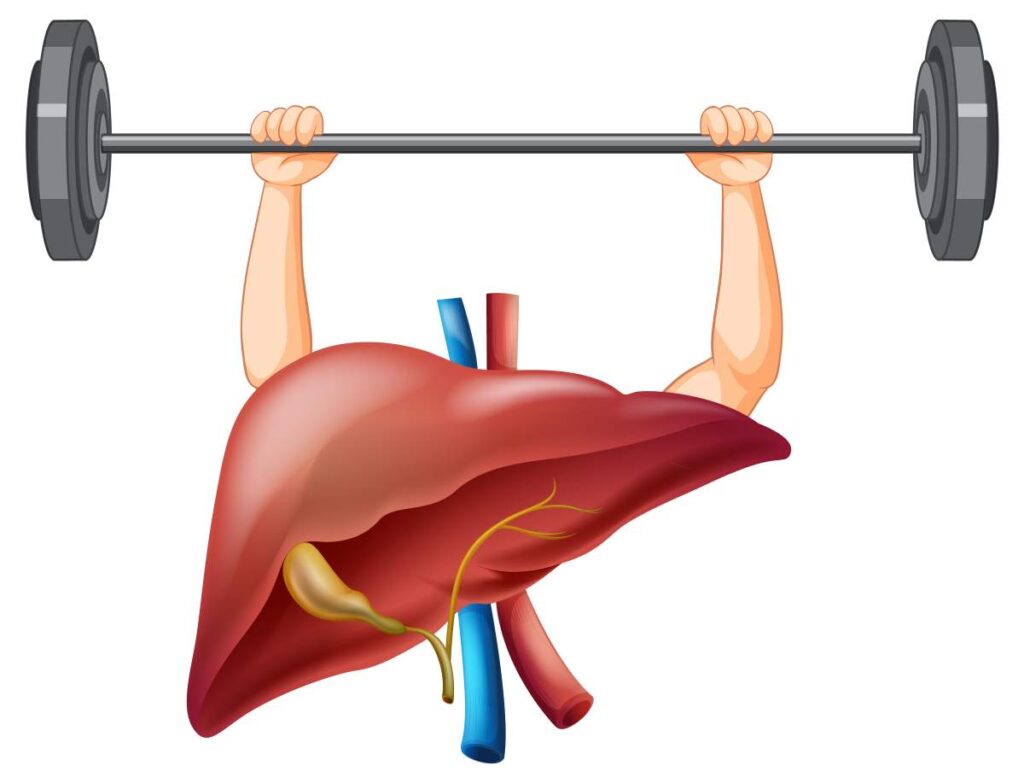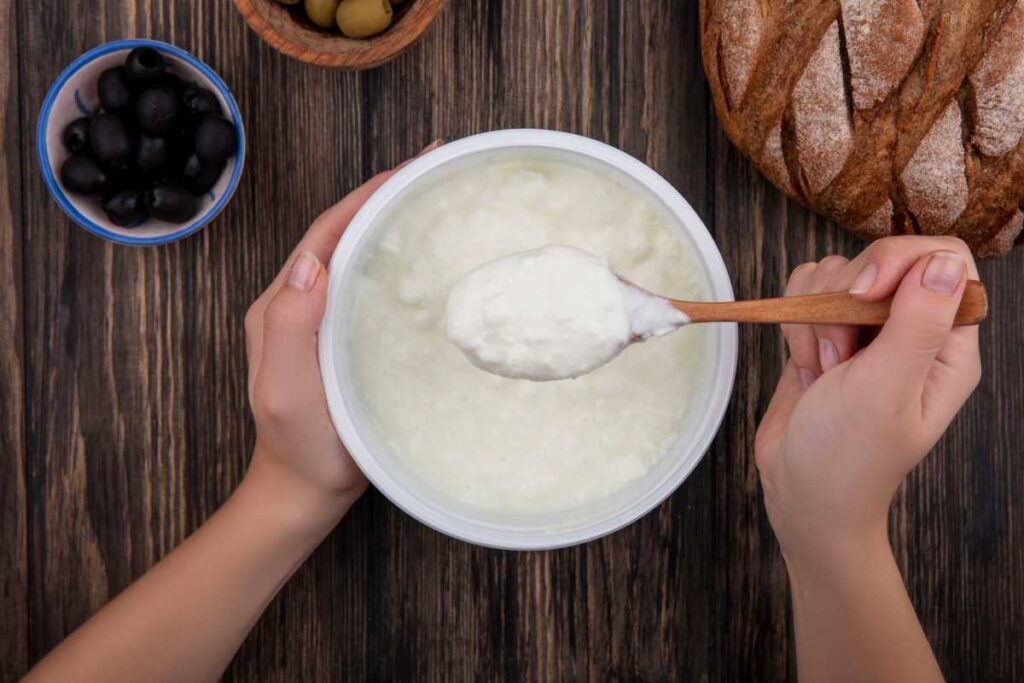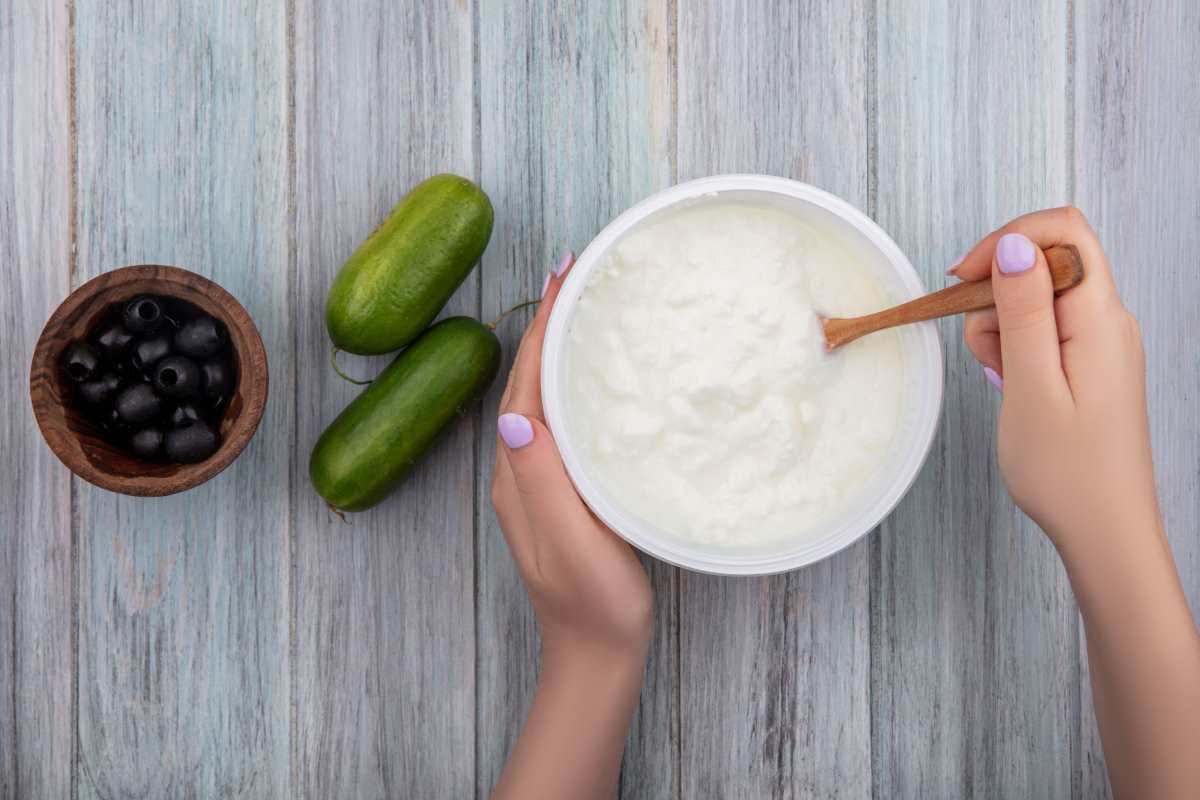
Curd, is a fermented dairy product that offers many health benefits according to the ancient Indian medical system of Ayurveda. It has been a staple in Indian cuisine for centuries. But did you know that curd is not just a delicious addition to your meals, but also a powerful superfood with numerous health benefits? According to Ayurveda, the ancient Indian system of medicine, curd is considered to be a sattvic food that promotes balance. Curd is loaded with natural probiotics, protein, calcium, vitamin B12, and probiotics and minerals that make it a nutritional powerhouse. Here we will explore some of the many curd benefits according to Ayurvedic principles.
Ayurveda considers curd to be an excellent food for balancing Vata dosha. The sour taste helps stimulate digestion, while the cooling quality helps balance excess pitta. When eaten in moderation, curd does not aggravate kapha. Here are some of the main curd benefits as described in Ayurvedic texts:
Improves Digestion

Ayurveda considers curd to be valuable for improving digestion or agni. The sour taste of curd stimulates digestive juices and bile flow from the liver. They also aid in the breakdown of complex carbohydrates and proteins, making them more easily digestible. Curd is light and easy to digest when made from cow or buffalo milk. The probiotics in curd also help promote a healthy gut microbiome, which aids digestion. Avoid curd made from non-fat or skim milk as it is more difficult to digest. Regular intake of curd can help alleviate digestive issues such as bloating, indigestion, and constipation. curd is known to strengthen the intestinal lining, thereby reducing the risk of leaky gut syndrome and other gastrointestinal disorders.
Cools the Body

Curd has a cooling potency that helps balance pitta dosha and excess body heat. The cold, creamy texture is soothing for the stomach and intestines. Curd is especially useful during summer to prevent heat-related issues like skin rashes, burning urination, and fatigue. Ayurveda recommends sprinkling a pinch of roasted cumin powder over a bowl of curd to enhance its cooling benefits.
Detoxifies the Liver

Due to its pungent taste and cooling nature, curd helps stimulate the liver to release toxins. Eating curd after a heavy meal helps aid digestion and prevents the buildup of toxins or ama in the GI tract. Curd mixed with roasted cumin powder and a pinch of salt makes an effective liver detox drink. The potassium in curd is also beneficial for liver and kidney function.
Improves Immunity

The probiotics in curd boost immunity by increasing the number of good bacteria in the gut. A healthy gut microbiome prevents the overgrowth of harmful bacteria and strengthens the immune response. Curd also provides immunological benefits due to its high zinc content which helps fight infections and aids wound healing, curd enhances the production of antibodies, which are proteins that recognize and neutralize harmful pathogens.
Promotes Heart Health

Curd contains conjugated linoleic acid (CLA) which has protective benefits for heart health. CLA can help lower high blood pressure, reduce plaque buildup in arteries and lower the risk of stroke and heart attack. Curd is also a good source of potassium which helps control blood pressure by countering the effects of sodium.
Increases Calcium Absorption

Among the other Benefits of Curd, one is that it enhances the absorption and bioavailability of calcium from other foods. The lactose and probiotics in curd help absorb calcium from the dairy itself as well as from vegetables and legumes eaten with it. Calcium is essential for building strong bones and teeth and maintaining bone density as we age.
Prevents Osteoporosis

The high calcium content in curd helps preserve bone mineral density and prevent osteoporosis. Curd is an especially important source of calcium for those avoiding milk. The magnesium and phosphorous in curd also contribute to bone health. Eating curd regularly can help reduce the risk of fractures and bone disorders.
Aids Weight Loss

Curd made from low-fat milk is low in calories and high in protein. The probiotics and calcium in curd also play a role in fat breakdown and weight management. Curd eaten before bedtime is considered particularly beneficial for aiding weight loss according to Ayurveda. The high protein content in curd helps in increasing satiety and reducing hunger pangs, making it an excellent food for weight management. It also boosts metabolism, allowing the body to burn calories more efficiently. The tryptophan in curd promotes restful sleep which is essential for appetite control and metabolic function.
Radiant Skin

Applying curd directly on the skin hydrates, exfoliates, and lightens the complexion naturally. The lactic acid present in curd acts as a natural exfoliant, gently removing dead skin cells and promoting a healthy glow. It also helps in reducing acne and blemishes, thanks to its anti-inflammatory and antibacterial properties. Curd’s zinc content also prevents acne and breakouts. Ayurveda recommends washing the face with plain yogurt and rinsing it off after 20 minutes to leave it soft, supple, and youthful skin.
Prevents Hair Loss

Curd hair masks can boost hair health, reducing damage, split ends and breakage, curd can be used as a natural conditioner for your hair. The protein, vitamins, and minerals in curd nourish the hair follicles and increase shine. Curd’s probiotics balance the scalp’s natural oils to reduce dandruff and itchiness. Applying curd on the scalp before washing the hair promotes stronger and more voluminous locks.
How to Consume Curd According to Ayurveda
Ayurveda provides some guidelines on how to incorporate curd into your diet:
- – Avoid cold or chilled curd as it hampers digestion and aggravates Vata and Kapha dosha. Curd is best consumed at room temperature.
- – Only eat curd made from whole milk, not low-fat or skimmed milk varieties. Sweeten plain curd with a little raw honey or fruits if desired.
- – Avoid combining curd with milk, sour fruits, fish, eggs or meat in the same meal as it creates incompatible food combinations.
- – Leave a gap of 1-2 hours before or after eating curd to allow proper digestion.
- – Curd should be avoided completely by those with sinus congestion, cough or cold. It can worsen respiratory issues caused by Kapha imbalance.
The ancient science of Ayurveda recognizes different types of curd based on taste, texture and effects on the body. The sweetness or sourness of curd depends on the aging process and the amount of starter culture added during preparation. Let’s explore some curd varieties described in Ayurvedic texts:
Manda Dahi, Svadu Dahi, Svadvamla Dahi, Amla Dahi (Dahi = Curd)
- Manda Dahi is an immature curd that hasn’t fully set. It lacks a defined taste, and appears like milk but slightly thick. Ayurveda advises against consuming manda dahi as it can imbalance Vata, Pitta, and Kapha doshas. It may cause burning sensations too.
- Svadu Dahi has a sweet taste, thick set texture with no sourness. This well-formed curd brings balance to Vata dosha. It boosts overall strength and stamina, and enhances hunger and weight gain. Svadu dadhi acts as an aphrodisiac as well. It provides a sweet post-digestive effect and helps combat bleeding disorders.
- Svadvamla Dahi offers a sweet taste with an astringent undertone. It has a thick, dense consistency. This type enhances digestion and provides unctuousness. Svadvamla dahi undergoes sour metabolization. It increases Pitta, Kapha doshas, bleeding tendencies, fat levels and inflammation.
- Amla Dahi has a distinctly sour taste and thin, watery texture. It leaves a pungent post-digestive effect. Amla dahi aggravates Pitta energy, and causes thirst, burning sensations, fever, diarrhea, vomiting, and skin diseases.
- Atyamla Dadhi is extremely sour, watery, and pungent in nature. It severely imbalances Vata, Pitta, and Kapha doshas. Atyamla dahi leads to severe thirst, burning sensations, fever, diarrhea, vomiting, toxicity, and skin disorders.
In summary, Ayurveda recognizes curd’s therapeutic or harmful effects based on preparation method, age, taste and qualities. Consuming fresh, well-set, sweet curd brings balance, while sour curd should be avoided. Incorporating curd wisely promotes health according to Ayurvedic wisdom.
Precautions and considerations when consuming curd
While curd offers numerous health benefits, there are a few precautions and considerations to keep in mind:-
- Individuals with lactose intolerance or dairy allergies should avoid consuming curd.
- It is also important to choose high-quality curd that is free from additives and preservatives.
- If you are making curd at home, ensure that you maintain proper hygiene and use fresh ingredients.
- It is recommended to consume curd in moderation, as excessive intake can lead to digestive discomfort.
- If you have any underlying health conditions or concerns, it is advisable to consult with a healthcare professional before making any significant changes to your diet.
Conclusion
Curd holds a special place in Ayurvedic nutrition due to its diverse benefits for digestion, liver function, immunity, heart health, weight loss and more. Made from whole milk and consumed fresh, curd balances all three doshas. Integrating curd into your meals as per Ayurvedic guidance allows you to fully experience its many health-giving properties. Pay heed to the ancient wisdom on curd benefits to boost your wellbeing.

